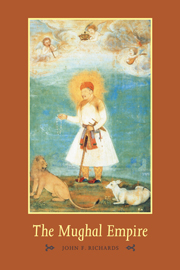Book contents
- Frontmatter
- Contents
- List of maps and tables
- General editor's preface
- Preface
- Introduction
- 1 Conquest and stability
- 2 The new empire
- 3 Autocratic centralism
- 4 Land revenue and rural society
- 5 Jahangir 1605–1627
- 6 Shah Jahan 1628–1658
- 7 The War of Succession
- 8 Imperial expansion under Aurangzeb 1658–1689
- 9 The economy, societal change, and international trade
- 10 Maratha insurgency and Mughal conquest in the Deccan
- 11 The Deccan Wars
- 12 Imperial decline and collapse, 1707–1720
- Conclusion
- Glossary
- Bibliographic essay
- Index
- THE NEW CAMBRIDGE HISTORY OF INDIA
3 - Autocratic centralism
Published online by Cambridge University Press: 28 March 2012
- Frontmatter
- Contents
- List of maps and tables
- General editor's preface
- Preface
- Introduction
- 1 Conquest and stability
- 2 The new empire
- 3 Autocratic centralism
- 4 Land revenue and rural society
- 5 Jahangir 1605–1627
- 6 Shah Jahan 1628–1658
- 7 The War of Succession
- 8 Imperial expansion under Aurangzeb 1658–1689
- 9 The economy, societal change, and international trade
- 10 Maratha insurgency and Mughal conquest in the Deccan
- 11 The Deccan Wars
- 12 Imperial decline and collapse, 1707–1720
- Conclusion
- Glossary
- Bibliographic essay
- Index
- THE NEW CAMBRIDGE HISTORY OF INDIA
Summary
Buoyed by conquest and plunder, Akbar and his advisers built a centralizing administration capable of steady expansion as new provinces were added to the empire. The Mughal emperor presided over a system that moved money, commodities, men, and information freely throughout the empire. The emperor and his advisers were vigorous managers who creatively adapted andresponded to changing circumstances. Building on this foundation, Akbar's successors oversaw steady growth in imperial effectiveness, power, and resources throughout the seventeenth century.
Akbar drew upon the rich Persian-derived administrative tradition of the Indo-Muslim states and the hard-edged, extraction-oriented, organizational tradition of the Turkic-Mongol conquest empires from the steppe. Within this context the emperor shaped a vertebrate structure characterized by centralized, hierarchical, bureaucratic offices. Filling these offices were technically qualified officials, functioning within standardized rules and procedures, who generated copious written orders and records. At the apex of this system the emperor acted as a vigorous and informed chief executive.
The first critical step occurred when Akbar allowed the position of chief minister or vakil to lapse and gathered all executive power in his hands. Thereafter he appointed four nearly co-equal central ministers. These officers occasionally came together as an advisory body, but they were in fact independent of each other within their own spheres. Their responsibilities were divided according to the most basic administrative functions as perceived by the emperor: finance and revenue; army and intelligence; the judiciary and religious patronage; and the royal household, with its central workshops, and buildings, and roads, and canals throughout the empire.
Keywords
- Type
- Chapter
- Information
- The Mughal Empire , pp. 58 - 78Publisher: Cambridge University PressPrint publication year: 1993



